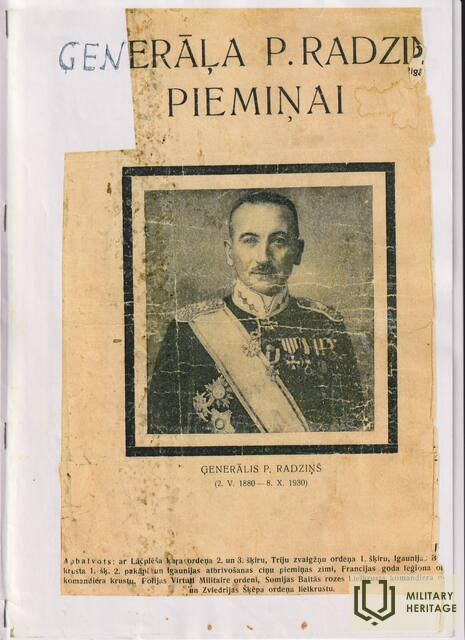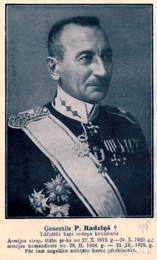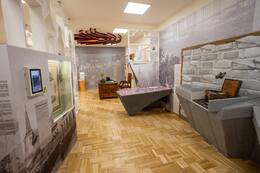Latvijos kariuomenės generolo, dukart Lāčplėsio karo ordino kavalieriaus Pēterio Radzinio atminimui.
Generolas Pēteris Radziņš gimė Lugažių valsčiuje, Valkos rajone, paprasto ūkininko šeimoje, kur išmoko dirbti lauko darbus. Jis buvo labai protingas jaunuolis, baigęs mokyklą pasirinko karą ir taip pradėjo savo karinę karjerą, gelbėdamas Latviją nuo Bermonto kariuomenės. P. Radziņš buvo vienas iškiliausių Latvijos armijos karininkų, apdovanotas daugybe Latvijos ir užsienio ordinų bei atminimo ženklų.
Jānis Radziņš – Pēterio Radzinio vyresnysis brolis, paskutinis šeimos namų „Jaunvīndedži“ savininkas : „Būdami berniukai, mes dažnai matuodavome savo jėgas. Pēteris niekada nepasidavė ir stengėsi tėvui įrodyti, kad yra toks pat stiprus kaip ir aš. Jis puikiai mokėsi mokykloje. Jau Lugažių parapijos mokykloje jis norėjo tapti „karininku“. Baigęs Valkos rajono mokyklą, Pēteris neatsisakė savo ketinimų ir savarankiškai ruošėsi egzaminams Pskovo karo mokykloje. Nuo ryto iki vakaro jis dirbo, bet sekmadieniais ir per pietus skaitė knygas. Darbininkai kartais niurzgėdavo, kad išsilavinęs žmogus dirba paprastus darbus. Mano brolis atsakydavo: „Noriu užsidirbti duoną dirbdamas, todėl ir dirbu.““
Janis Radziņš, kalbėdamas apie jaunesniojo brolio santykius, sako: „Mano brolis mirė būdamas viengungis, nors gyvenime turėjo keletą palankių progų vesti. Kai paklausdavau brolio apie vedybas, jis visada atsakydavo: „Kareivis karo metu neturi kur dėti žmonos.““
„Iki šiol, prieš mirtį, Petras dvi savaites gyveno pas mus. Jis nebūtų taip greitai grįžęs į miestą, jei nebūtų iš atsitiktinai gautos radijo žinutės sužinojęs, kad jam skubiai reikia stoti prieš karo teismą kaip liudytojui. Generolas neteisingai suprato šaukime pateiktą informaciją, kodėl kelionė netikėta. Tai jį akivaizdžiai neramino. Jis dar nenorėjo palikti savo sodybos. Tačiau pareigos pašauktas paliko tėvo namus ir gimines – visiems laikams.“
Generolas Janis Balodis – Pēterio Radzinio kolega ir draugas : „Spalio 26 d. vakare į štabą atvyko energingas ir protingos išvaizdos ponas paprastais, juodais privačiais drabužiais. Štabe jis prisistatė – pulkininku Radziniu. Radzinį pažinojau nuo senų laikų, ir tai taip pat buvo sutapimas! Tai nebuvo pirmas kartas, kai susitikome didžiojoje Rusijos armijoje – Radziniai, Baložiai, Ozoli, kurie vienas kitą pažinojo pagal savo latviškas pavardes. „Iš kur jūs?“ – „Aš iš Valkos.“ „Bet aš iš Trikatės.“ Taip mes, atsitiktinai susitikę Valceno gyventojai, tapome draugais.“
„Generolas Radziņš įeis į mūsų istoriją kaip karo vadas – ne mažiau nuopelnų jis turi kaip armijos kūrėjas ir mokytojas. Negalime pamiršti, kad mūsų nacionalinė armija subūrė karininkus iš skirtingų armijų, su skirtingu išsilavinimu ir tradicijomis – visi jie turėjo būti sujungti į vieną suderintą Latvijos karininkų korpusą. Šiame darbe ypač svarbios buvo puikios Radzinio žinios, kurias jis papildė atkakliu atsidavimu iki paskutinės valandos. Jos gyvuos mūsų nacionaliniame kareivyje tol, kol egzistuos mūsų tauta, ir tai yra jo nemirtingumas, kurį jis pats sukūrė ir kurio niekas negali iš jo atimti.“
Pulkininkas leitenantas Aleksandras Plesneris : „Pokalbiuose jis niekada nesigiri savo patirtimi ir asmenybe. Priešingai, jis tik studijuoja ir stebi kitus bei tai, kas vyksta. Jis ramiai atlieka kiekvieną jam pavestą darbą, o vyriausiasis vadas turi ilgai įtikinėti jį imtis štabo viršininko užduočių. Ne todėl, kad jis jaustųsi joms nepasiruošęs, bet todėl, kad žino, jog kiti čia dirba jau seniai, tapo geriau žinomi ir, tikėtina, pavaldinių pasitikėjimas didesnis. Ir iš tiesų, keista, iš pradžių ne be išankstinio nusistatymo pavaldiniai ir kiti stebi naująjį, nepažįstamąjį štabo viršininką. Jo išvaizda, kuri buvo dar mažiau apoloniška nei vėliau, plonos, ilgos ir tvirtai sulenktos kojos ir, svarbiausia, rašysena, kuri primena vietinio rašliavas ir iš pradžių pilna rusiškų sakinių, žodžių ir raidžių – visa tai iš pradžių, regis, sukelia šypseną.“
„Mažiausi lašeliai perskelia net kiečiausią uolą. Ir kiek lašų smulkmeniškumo, kiek pikto kvailumo išlieta ant šios didelės, vienišos širdies, padarydami ją išmintingesnę, nejautresnę. „Radziņš yra politikuojantis generolas. Radziņš organizuoja sąmokslus, Radziņš neįvykdė perversmo tik todėl, kad jam trūko drąsos. Radziņš neturi vietos armijoje“, – kitiems visa tai galėjo pasirodyti juokinga, bet pačiam Radziniui tai vis tiek buvo skaudus įžeidimas. Abejodamas savo geriausiais įsitikinimais ir šviesiausiais ketinimais, niekieno rimtai neginamas, jis buvo priverstas vis giliau užsisklęsti savyje ir savo vienatvėje.
Pulkininkas Teodorsas Andersonas : „Peteris Radziņš daug skaitė ne tik karinius, bet ir filosofinius straipsnius. Jis taip pat domėjosi religiniais klausimais. Buvo malonu su juo kalbėtis. Dažnai aptardavome pačius įvairiausius klausimus. Iš prigimties jis buvo labai jautrus ir dažnai kiekvieną smulkmeną imdavo prie širdies, nors to niekada nerodydavo išoriškai ir atrodydavo abejingas. Todėl dažnai patirdavo nusivylimų. Kaip karinis specialistas ir kariuomenės gyvenimo žinovas, jis yra labai vertinamas.“
„Velionis visą šį laiką gyveno labai ramiai ir padoriai. Vakarais dažnai sėdėdavome kartu. Jis retai eidavo į vakarėlius ir balius. Nemėgo draugauti su kitais, bet visada mėgo būti vienas. Jis buvo karininkas, kuris savo darbą ir žinias paaukojo mūsų kariuomenės formavimui. Visuomenėje, kurioje retai pasirodydavo, buvo linksmas, nuoširdus ir imlus. Mėgo juoktis ir pokštauti. Jis buvo paslaugus visiems, kurie į jį kreipdavosi. Gyvenime jis dažnai užsisklenddavo savyje, bet kur reikėdavo – nebijodavo atvirai reikšti savo minčių, nors tai kartais sukeldavo problemų ir išpuolių. Pažįstu jį kaip didelį patriotą.“
Artimas karo draugas : „Iš prigimties nepaprastai uždaras, visada eidavo į darbą, jis neieškojo visuomenės. Tačiau bendraudamas su žmonėmis, kaip tikras europietis, jis visada buvo malonus, besišypsantis ir nepaprastai šmaikštus. Atviresnis su draugais, tačiau santūrus, niekada familiarus. Jis niekada nepasakydavo nereikalingo žodžio nei darbe, nei privačiuose pokalbiuose. Jei nesutikdavo, dažniausiai tyliai kentėdavo ir ironiškai šypsodavosi arba trumpai ir aiškiai paaiškindavo savo nuomonę. Jo atsakymai visada pataikydavo į dešimtuką. Visada santūrus ir susivaldantis, tvirto charakterio žmogus, jis mokėjo įveikti savo nervingumą ir neerzindavo kitų.“
„Niekada nematėme generolo Radzino pikto ir susijaudinusio“, – vienbalsiai sako jo kolegos. Kartais, kai to reikalavo tarnyba, jis apsimesdavo griežtu, bet niekada neišliedavo pykčio. Niekada nekeldavo balso, kuris paprastai būdavo plieninis.“
Knyga – Generolo Pēterio Radzinio atminimui
Susijusi laiko juosta
Susijusios temos
Susijusios vietos
Generolo Pēterio Radziņa memorialinė vieta
Įsikūręs Valkos valsčiuje, važiuojant keliu Valka–Rūjiena (P22) 4 kilometre, pasukite į dešinę, sekant nuorodas.
Pēteris Radziņš gimė 1880 m. gegužės 2 d. Lugažių parapijos „Jaunvīndedzēs“. Mokėsi Lugažių parapijos mokykloje, Valkos miesto mokykloje ir Valkos Nelsono realinėje mokykloje. Savanoriu įstojo į Rusijos armiją. 1919 m. rudenį grįžo į Latviją ir spalio 27 d. buvo paskirtas Vyriausiojo armijos vado štabo viršininku, šias pareigas užimdamas tuo metu, kai bermontininkai kėlė grėsmę Rygai. Būdamas štabo viršininku, jis vadovavo visiems mūšiams Rygoje, Žiemgaloje ir Latgaloje. 1920 m. vasario 5 d. buvo paaukštintas generolu.
Šiandien šalia šeimos namų galima pamatyti generolui Pēteriui Radzinšui (1880–1930) skirtą atminimo akmenį.
2017 m. lapkričio 11 d. Rygoje, Dauguvos vartų kampe, buvo atidengta memorialinė lenta Pēteriui Radžiniui.
Vaizdo įrašas: Generolo P. Radzinio atminimo renginys Rygos brolių kapinėse 2019 m.
Vaizdo įrašas: 2019 m. gegužės 2 d., minint generolo Pēterio Radzinio 139-ąsias gimimo metines, Lapkričio 11-osios krantinėje, netoli Prezidento rūmų, vyko atminimo renginys, kuriame garbės sargybos stulpai ir susidomėję asmenys apsupo atminimo lentą.
Valkos kraštotyros muziejaus ekspozicijoje „Valka – Latvijos nepriklausomybės lopšys“ taip pat atsispindi generolo Pēterio Radzinio gyvenimas ir veikla.
Be tradicinių kolekcijos eksponavimo būdų, parodoje naudojami interaktyvūs multimedijos sprendimai. Informacija ir anotacijos verčiamos į estų ir anglų kalbas.
Ekspozicija „Valka – Latvijos Nepriklausomybės lopšys“
Valkos kraštotyros muziejus yra Valkoje, dešinėje Rygos gatvės pusėje, istoriniame Vidžemės parapijos mokyklos mokytojų seminarijos pastate. Nuo 1853 iki 1890 m. pastate veikė Vidžemės parapijos mokyklos mokytojų seminarija. Iki 1881 m. jai vadovavo Janis Cimze, mokytojas ir Latvijos chorinės kultūros pradininkas. Uždarius mokyklos mokytojų seminariją, pastatas 80 metų tenkino įvairius švietimo, kultūros ir buities poreikius. Nuo 1970 m. pastate įsikūręs Valkos kraštotyros muziejus. Nuolatinė muziejaus ekspozicija „Valka – Latvijos nepriklausomybės lopšys“ pasakoja apie socialinius ir politinius įvykius Valkoje nuo 1914 iki 1920 m., kai Latvija tapo nepriklausoma valstybe. Ekspozicija atspindi pasirengimą Latvijos valstybės įkūrimui ir Šiaurės Latvijos brigados formavimui Valkoje. Parodoje, perteikiant keturias prasmes – Kelį, Tarybą, Būstinę ir Namus, daugiausia dėmesio skiriama temoms, susijusioms su Valkos miestu, pabėgėliais, Latvijos ūkininkų sąjungos įkūrimu (1917 m.),
Latvijos laikinoji nacionalinė taryba (1917 m.), Latvijos laikinasis nacionalinis teatras (1918 m.), Laikinoji Sovietų Latvijos vyriausybė, žinoma kaip Iskolat, Šiaurės Latvijos brigada (1919 m.) ir generolas Pēteris Radziņš. Be tradicinių kolekcijų eksponavimo būdų, parodoje naudojami interaktyvūs multimedijos sprendimai.







